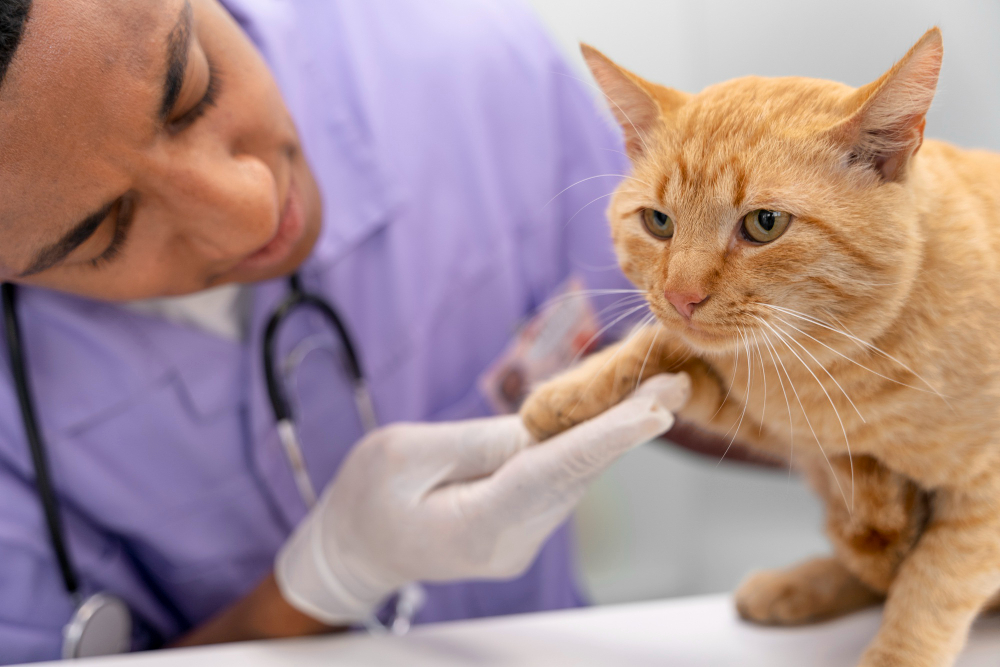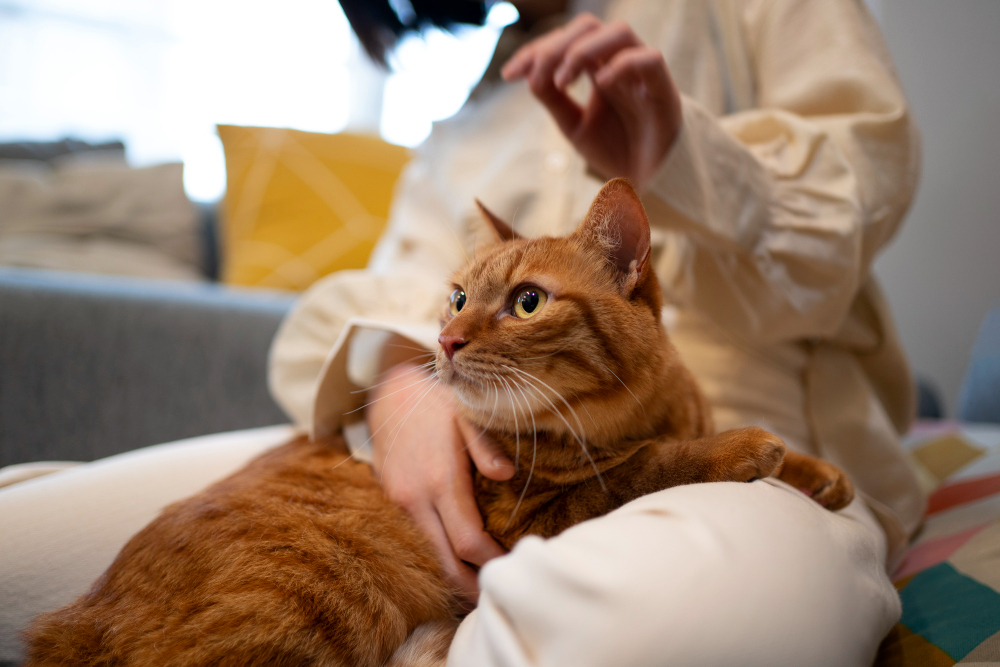Have you ever noticed your cat’s pupils dilating and wondered why? It’s a common concern among cat owners, and rightfully so. Your feline friend’s eyes can reveal a lot about their health and emotions. So, why are your cat’s pupils dilated? Let’s unravel this mystery together.
There are several possible causes for dilated pupils in cats. One of the most common reasons is low light conditions. Cats have a remarkable ability to adjust their pupils to let in more or less light, depending on the situation. When it’s dark, their pupils dilate to allow more light in, improving their night vision.
However, dilated pupils can also be a sign of something more serious. Medical conditions such as hypertension, eye infections, or neurological issues can cause the pupils to dilate. If you notice your cat’s pupils staying dilated for an extended period or if they are accompanied by other concerning symptoms, it’s crucial to consult your veterinarian for a proper diagnosis and treatment.
Emotions can also play a role in dilated pupils. Cats may have dilated pupils when they are excited, scared, or feeling threatened. It’s their body’s way of preparing for a fight or flight response. Environmental factors, such as sudden loud noises or unfamiliar surroundings, can trigger this reaction in cats.
In conclusion, dilated pupils in cats can be caused by various factors, including low light conditions, medical conditions, emotions, and environmental factors. While it’s normal for a cat’s pupils to dilate and constrict throughout the day, persistent dilation or accompanying symptoms should be addressed by a veterinarian. Understanding the reasons behind your cat’s dilated pupils can help you ensure their well-being and provide appropriate care.

Why Are Your Cat’s Pupils Dilated? Understanding the Causes
Cats have the ability to control the size of their pupils, which can vary depending on various factors. One possible reason for dilated pupils in cats is low light conditions. When the environment is dim, their pupils expand to allow more light to enter the eyes, enhancing their vision. Another common cause is arousal or excitement. When cats are excited or stimulated, their pupils dilate as a response. Additionally, certain emotions such as fear or aggression can also lead to dilated pupils in cats.
Exploring the Factors
Understanding the factors that contribute to dilated pupils in cats is crucial in determining the underlying cause. Factors such as lighting conditions, emotional state, and overall health can all play a role. By considering these factors, you can gain a better understanding of why your cat’s pupils may be dilated and take appropriate action if necessary.
How To Fix Dilated Cat Pupils: Helpful Tips and Advice
Cats with dilated pupils can be a cause for concern, but there are steps you can take to help alleviate the issue.
1. Create a Calm Environment
By providing a peaceful and stress-free atmosphere, you can help your cat relax and reduce pupil dilation. Dimming the lights and playing soothing music can create a soothing environment.
2. Consult with a Veterinarian
If your cat’s dilated pupils persist or are accompanied by other concerning symptoms, it is important to seek professional advice. A veterinarian can perform a thorough examination and provide appropriate treatment options.
3. Monitor Your Cat’s Behavior
Keeping a close eye on your cat’s behavior can help you identify any potential triggers for pupil dilation. If you notice any patterns or changes, it can be helpful information for your veterinarian.
Remember, while dilated pupils can be a sign of underlying health issues, they can also be a normal response to certain stimuli. By following these tips and seeking professional guidance when needed, you can help ensure your cat’s well-being.
Common Reasons Why Cats Have Dilated Pupils
Understanding the Causes
Cats have dilated pupils for various reasons, and it’s important to understand these causes to ensure their well-being. One common reason is low lighting conditions, as cats’ pupils naturally dilate in dim environments to allow more light in. Another cause could be excitement or fear, as cats’ pupils dilate in response to heightened emotions. Additionally, certain medications or substances, such as eye drops or drugs, can cause dilation. Health issues like hypertension or neurological problems can also lead to dilated pupils. It’s crucial to pay attention to other accompanying symptoms and seek veterinary advice if necessary. Regular eye check-ups are recommended to detect any underlying conditions. Remember, dilated pupils in cats are a sign that something is going on, so it’s essential to investigate further and provide appropriate care.
What Should I Do About My Cat’s Dilated Pupils?
Immediate Attention is Key
If you notice that your cat’s pupils are dilated, it is important to take immediate action. Dilated pupils can be a sign of an underlying health issue or injury that requires prompt attention.
Consult a Veterinarian
The first step is to consult with a veterinarian. They will be able to examine your cat and determine the cause of the dilated pupils. It could be due to a variety of reasons, such as pain, stress, or even a neurological problem.
Observe Other Symptoms
While waiting for your vet appointment, it is crucial to observe any other symptoms your cat may be experiencing. This information will be helpful for the vet in making an accurate diagnosis. Look out for changes in behavior, appetite, or any signs of distress.
Taking immediate action and seeking professional help is vital when it comes to your cat’s dilated pupils. Remember, your furry friend relies on you to ensure their well-being.
Why Are Your Cat’s Pupils Dilated? Exploring the Factors
Dilated pupils in cats can be caused by various factors, each indicating a different underlying issue. One possible reason is low light conditions, as cats have a natural ability to dilate their pupils to let in more light and improve their vision in dim environments. Another factor could be fear or stress, as cats may have dilated pupils when they feel threatened or anxious. Additionally, certain medications or drugs can cause pupil dilation in cats. It is also important to consider potential health problems such as eye infections, glaucoma, or neurological issues, which can all lead to dilated pupils. By understanding the factors that contribute to dilated pupils in cats, you can better assess your cat’s situation and determine the appropriate course of action.
How To Fix Dilated Pupils in Cats: Expert Recommendations
If you notice that your cat’s pupils are dilated, it is important to take the necessary steps to address the issue. There are several expert recommendations that can help you fix dilated pupils in cats.
Firstly, it is crucial to determine the underlying cause of the dilation. This can be done by observing your cat’s behavior and consulting with a veterinarian. Once the cause is identified, appropriate treatment can be administered. For example, if the dilation is due to pain or injury, pain medication may be prescribed. If it is a result of an underlying medical condition, such as hypertension or glaucoma, specific medications or therapies may be recommended.
In addition to medical intervention, creating a calm and stress-free environment for your cat can also help alleviate dilated pupils. Providing a comfortable space, minimizing loud noises, and ensuring regular play and exercise can all contribute to a sense of well-being for your feline friend.
Remember, it is always best to consult with a veterinarian for proper diagnosis and guidance on how to fix dilated pupils in cats.
What Should I Do If My Cat Has Dilated Pupils? Essential Steps to Take
If you notice that your cat’s pupils are dilated, it is important to take the appropriate steps to ensure their well-being. Firstly, remain calm and observe your cat’s behavior. Are they showing any other signs of distress or discomfort? If so, it may be necessary to seek immediate veterinary attention.
Next, try to identify any potential triggers or causes for the dilated pupils. Has your cat been exposed to any new environments, substances, or stressful situations? This information can be helpful for your veterinarian in determining the underlying cause.
In the meantime, create a calm and quiet environment for your cat. Provide them with a comfortable space to rest and ensure they have access to fresh water and food. Avoid any sudden movements or loud noises that may further stress them.
Ultimately, consulting with a veterinarian is crucial in addressing your cat’s dilated pupils. They will be able to conduct a thorough examination, diagnose any potential issues, and recommend appropriate treatment options. Remember, the well-being of your furry friend is of utmost importance, so don’t hesitate to seek professional help.










